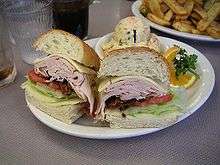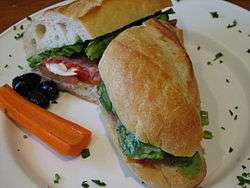Definify.com
Webster 1913 Edition
Sandwich
Sand′wich
(?; 277)
, Noun.
[Named from the Earl of
Sandwich
.] Two pieces of bread and butter with a thin slice of meat, cheese, or the like, between them.
Sand′wich
,Verb.
T.
[
imp. & p. p.
Sandwiched
; p. pr. & vb. n.
Sandwiching
.] To make into a sandwich; also, figuratively, to insert between portions of something dissimilar; to form of alternate parts or things, or alternating layers of a different nature; to interlard.
Definition 2026
Sandwich
Sandwich
English
Proper noun
Sandwich
- a town in Kent, south-east England, one of the historic Cinque Ports
- an English habitational surname originating from this town
- one of several younger towns named after the town in Kent or after a person bearing the surname:
- Sandwich, Massachusetts, pop. 20,136 (2000)
- Sandwich, Illinois, pop. 6,509 (2000)
- Sandwich, New Hampshire, pop. 1,286 (2000)
Derived terms
German

Sandwich
Etymology
Borrowing from English sandwich.
Pronunciation
- (Germany) IPA(key): /ˈsɛndvɪt͡ʃ/, /ˈzɛndvɪt͡ʃ/
Noun
Sandwich n, m (genitive Sandwiches or Sandwichs or Sandwich, plural Sandwiches or Sandwichs or Sandwiche)
- sandwich (snack)
Usage notes
- The German word is commonly used only for more richly filled sandwiches, typically with salad and sauce.
- The noun is generally neuter, but may be treated as masculine by some speakers.
- The inflected forms above are loosely ordered by frequency. The plural is usually Sandwiches in formal writing, but the two alternative plurals are equally frequent in common usage.
sandwich
sandwich
English

An Italian sandwich.
Noun
sandwich (plural sandwiches or sandwichs)
- A dish or foodstuff where two or more slices of bread serve as the wrapper or container of some other food.
- 2002, Serena Carrington, Avalon, Writers Club Press, p.92:
- He laid out a linen tablecloth and a few sandwichs from some bread, dressing, and beef.
- 2012, Allie McNeil, Watergate Summer, AuthorHouse, p.160:
- And the only "care" I could offer was egg sandwichs and Lilly's unfaltering attention.
- 2002, Serena Carrington, Avalon, Writers Club Press, p.92:
- (by extension) Any combination formed by layering one type of material between two layers of some other material.
- (Britain) A layer cake or sandwich cake.
- 2016, Alysa Levene, Cake: A Slice of History
- […] our local agricultural fair in Warwickshire even has a category for Victoria sandwiches baked by male bakers.
- 2016, Alysa Levene, Cake: A Slice of History
Synonyms
- See Wikisaurus:sandwich
Hyponyms
- (closed, ground beef, on a bun): hamburger, burger
- (closed, other meats, on a bun; informal): -burger
- (closed, ground beef, on bread): patty melt
Derived terms
Terms derived from sandwich
Descendants
Descendants of sandwich in other languages
|
Translations
snack consisting of two slices of bread
|
|
open sandwich — see open sandwich
Verb
sandwich (third-person singular simple present sandwiches, present participle sandwiching, simple past and past participle sandwiched)
- To place one item between two other, usually flat, items
- (figuratively) To put or set something between two others, in time.
- 2011 April 11, Phil McNulty, “Liverpool 3 - 0 Man City”, in BBC Sport:
- Dirk Kuyt sandwiched a goal in between Carroll's double as City endured a night of total misery, with captain Carlos Tevez limping off early on with a hamstring strain that puts a serious question mark over his participation in Saturday's FA Cup semi-final against Manchester United at Wembley.
-
Translations
to place one item between two other, usually flat, items
Adjective
sandwich (not comparable)
Usage notes
- The adjective sense is used primarily by restaurants specializing in barbeque, and does not imply that the meal includes an actual sandwich.
Dutch
Pronunciation
- Hyphenation: sand‧wich
Etymology
Borrowing from English sandwich.
Noun
sandwich m (plural sandwiches, diminutive sandwichje n)
Usage notes
French
Etymology
Borrowing from English sandwich
Pronunciation
- IPA(key): /sɑ̃.dwitʃ/
Noun
sandwich m (plural sandwichs)
- sandwich (snack)
Usage notes
- Note that French does not follow the English rule of adding es to nouns ending in the sound /tʃ/. Since the final /s/ is not pronounced in the plural, there is no difficulty in pronouncing the plural formed by adding s rather than es.
